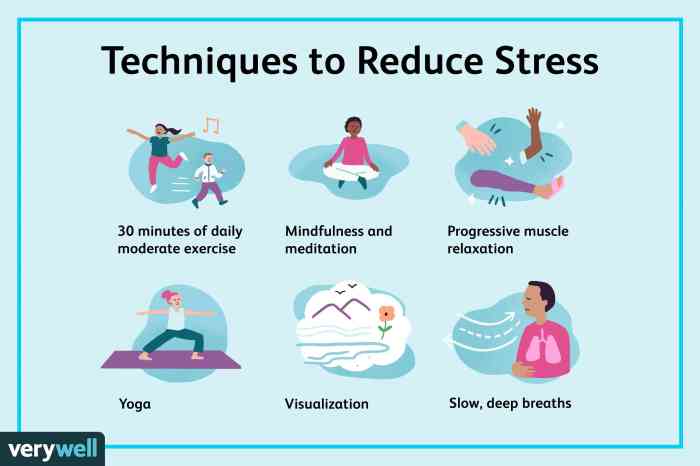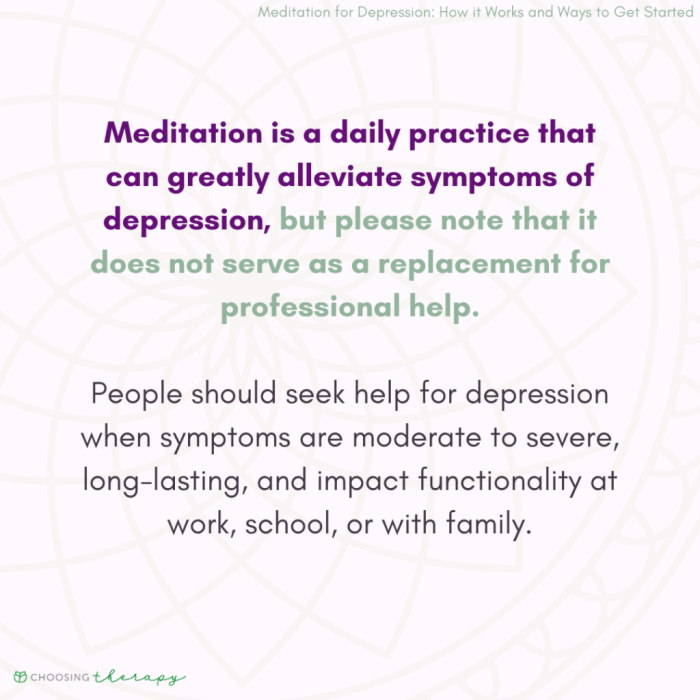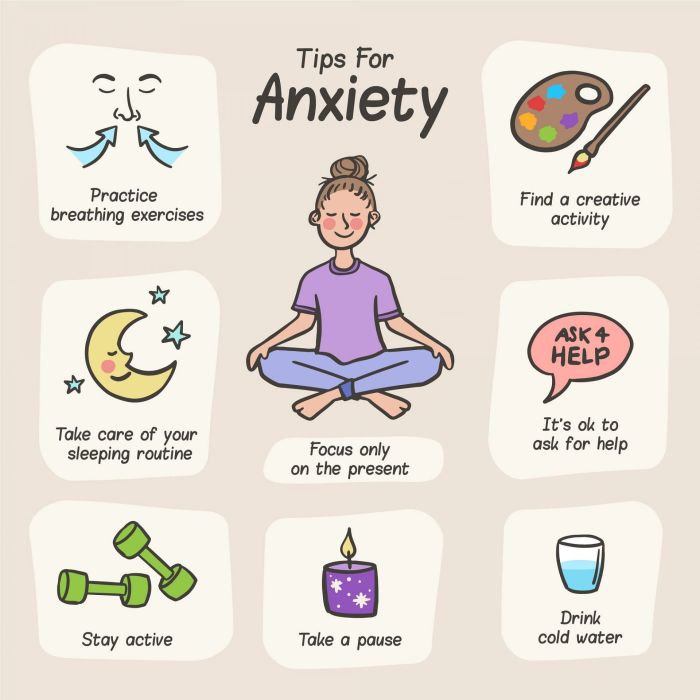6 Ways Meditation Can Help Relieve Depression sets the stage for this enthralling narrative, offering readers a glimpse into a story that is rich in detail with casual trendy Jakarta South style and brimming with originality from the outset.
Meditation is not just about finding inner peace but also about combating depression. This article delves into the powerful ways meditation can be a game-changer in alleviating the symptoms of depression.
Introduction to Meditation and Depression

Meditation is a practice that involves focusing the mind on a particular object, thought, or activity to achieve mental clarity and emotional calmness. It is often used to cultivate mindfulness, promote relaxation, and enhance overall well-being.
Depression, on the other hand, is a common mental health disorder characterized by persistent feelings of sadness, hopelessness, and a loss of interest in activities. It can significantly impact a person’s quality of life, affecting their ability to function in daily activities and maintain healthy relationships.
Potential Benefits of Using Meditation for Depression
- Reduced Stress Levels: Meditation techniques such as deep breathing and mindfulness can help reduce stress hormones in the body, promoting a sense of calm and relaxation.
- Improved Emotional Regulation: By practicing meditation regularly, individuals can develop greater emotional awareness and learn to manage negative thoughts and emotions effectively.
- Enhanced Self-Awareness: Meditation encourages self-reflection and introspection, allowing individuals to gain a deeper understanding of their thoughts, behaviors, and emotions.
- Boosted Mood: Engaging in meditation practices can stimulate the release of feel-good neurotransmitters like serotonin and dopamine, which can help uplift mood and reduce symptoms of depression.
- Better Sleep Quality: Meditation can promote relaxation and reduce insomnia symptoms, leading to improved sleep patterns and overall well-being.
- Increased Resilience: Regular meditation practice can build mental resilience and provide individuals with coping strategies to navigate challenges and setbacks more effectively.
Understanding the Connection Between Meditation and Depression

Meditation has been shown to have a profound impact on mental well-being, particularly when it comes to relieving symptoms of depression. Research has delved into how meditation affects the brain and overall mental health, shedding light on the positive outcomes it can bring to individuals struggling with depressive symptoms.
Impact on Brain and Mental Well-being
- Meditation has been found to promote neuroplasticity, which is the brain’s ability to reorganize itself by forming new neural connections. This can lead to improved cognitive function and emotional regulation, which are often affected by depression.
- Studies have shown that regular meditation practice can reduce the activity of the amygdala, the brain’s fear center, leading to decreased feelings of anxiety and stress.
- Through meditation, individuals can learn to cultivate a sense of mindfulness and present-moment awareness, which can help alleviate rumination and negative thought patterns commonly associated with depression.
Research and Studies
- A study published in JAMA Internal Medicine found that mindfulness meditation practices can be as effective as antidepressant medication in treating symptoms of depression.
- Research from the University of Oxford showed that mindfulness-based cognitive therapy (MBCT) significantly reduced the risk of relapse in individuals with recurrent depression.
- Another study conducted at Johns Hopkins University found that mindfulness meditation can have long-lasting effects on reducing symptoms of anxiety, depression, and pain.
Mindfulness Practices in Meditation
- By cultivating mindfulness through meditation, individuals can develop a greater awareness of their thoughts and emotions, allowing them to observe them without judgment.
- Practicing mindfulness can help individuals recognize triggers for depressive episodes and develop healthier coping mechanisms to navigate challenging emotions.
- Through mindfulness practices, individuals can build resilience and emotional regulation skills, enabling them to respond to stressors in a more adaptive and constructive manner.
Techniques for Meditating to Relieve Depression

Incorporating specific meditation techniques can be highly beneficial in managing symptoms of depression. These techniques are designed to promote mindfulness, self-awareness, and inner peace, which can help alleviate the negative effects of depression.
Mindfulness Meditation
- Focus on your breath and observe your thoughts without judgment.
- Practice being present in the moment and accepting your emotions.
- Start with short sessions and gradually increase the duration.
Loving-Kindness Meditation
- Direct positive energy and compassion towards yourself and others.
- Repeat phrases of loving-kindness and cultivate feelings of goodwill.
- Begin with yourself, then extend to loved ones, acquaintances, and even those you have difficulty with.
Body Scan Meditation
- Focus on each part of your body, starting from your toes and moving upwards.
- Notice any sensations or tension without trying to change them.
- Release any tension or stress as you progress through each body part.
Mantra Meditation
- Repeat a calming word or phrase silently or aloud.
- Allow the mantra to anchor your mind and bring a sense of peace.
- Let go of distracting thoughts and return to the mantra whenever necessary.
Visualization Meditation
- Imagine a peaceful place or scenario in your mind.
- Engage all your senses to make the visualization as vivid as possible.
- Use this mental imagery to relax and find inner calmness.
Mindfulness and Meditation

Mindfulness is the practice of being fully present and aware of your thoughts, emotions, and sensations in the present moment without judgment. It involves paying attention to the present moment and accepting it as it is.
Building Emotional Resilience, 6 Ways Meditation Can Help Relieve Depression
- By incorporating mindfulness practices in meditation, individuals can develop emotional resilience by learning to observe their thoughts and feelings without getting caught up in them. This helps in reducing the impact of negative emotions and stress.
- Mindfulness meditation can help individuals regulate their emotions and respond to challenging situations with more clarity and calmness. This can lead to a greater sense of control over one’s emotional state, thus reducing the symptoms of depression.
- Through regular practice of mindfulness meditation, individuals can enhance their ability to bounce back from setbacks and difficulties, leading to increased emotional strength and resilience.
“Mindfulness meditation helps individuals cultivate a sense of inner peace and stability, which can contribute to a more positive outlook on life and improved emotional well-being.”
Meditation as a Complementary Therapy for Depression: 6 Ways Meditation Can Help Relieve Depression

Meditation can serve as a valuable complementary therapy to traditional approaches for treating depression. When used in conjunction with medication or psychotherapy, it can offer additional benefits and enhance overall well-being and mental health.
Benefits of Combining Meditation with Medication or Psychotherapy
- Meditation can help individuals better manage their symptoms of depression alongside medication. It can promote a sense of calm and reduce stress, enhancing the effectiveness of the prescribed medication.
- When used in conjunction with psychotherapy, meditation can provide individuals with coping mechanisms and tools to navigate their emotions and thoughts more effectively. This combination can lead to more comprehensive and holistic treatment.
- Combining meditation with traditional therapies can also help individuals develop a greater sense of self-awareness and mindfulness, enabling them to address underlying issues contributing to their depression more effectively.
Enhancing Overall Well-being with Meditation
- Meditation can improve overall mental health by promoting relaxation and reducing the negative impact of stress on the mind and body.
- Regular meditation practice can enhance emotional stability and resilience, allowing individuals to better cope with challenging situations and negative emotions associated with depression.
- By incorporating meditation into their daily routines, individuals can cultivate a sense of inner peace and contentment, fostering a positive outlook on life and improving their overall quality of life.
Lifestyle Changes and Meditation for Long-Term Relief from Depression
Incorporating meditation into a holistic approach to mental health is essential for achieving long-term relief from depression. Lifestyle changes such as diet, exercise, and sleep can work synergistically with meditation to support mental well-being and promote overall wellness.
Importance of Lifestyle Changes
- Proper nutrition plays a crucial role in supporting brain health and mood regulation. Consuming a balanced diet rich in fruits, vegetables, whole grains, and lean proteins can positively impact mental health.
- Regular exercise has been shown to reduce symptoms of depression by releasing endorphins and improving overall well-being. Incorporating physical activity into your daily routine can enhance the benefits of meditation.
- Prioritizing adequate sleep is vital for mental health. Quality sleep allows the brain to recharge and process emotions effectively, contributing to a positive mindset and reduced risk of depression.
Creating a Daily Routine
- Start your day with a mindfulness meditation session to set a positive tone for the day ahead. Focus on your breath and allow yourself to be present in the moment.
- Integrate short meditation breaks throughout your day to alleviate stress and promote relaxation. Even a few minutes of deep breathing can make a significant difference in your mental well-being.
- Establish a bedtime meditation ritual to unwind and calm your mind before sleep. Engaging in guided meditation or progressive muscle relaxation can help you achieve a restful night’s sleep.
Conclusion
Embrace the transformative power of meditation as a tool to tackle depression head-on. By incorporating these practices into your daily routine, you can pave the way for a brighter and more peaceful future.